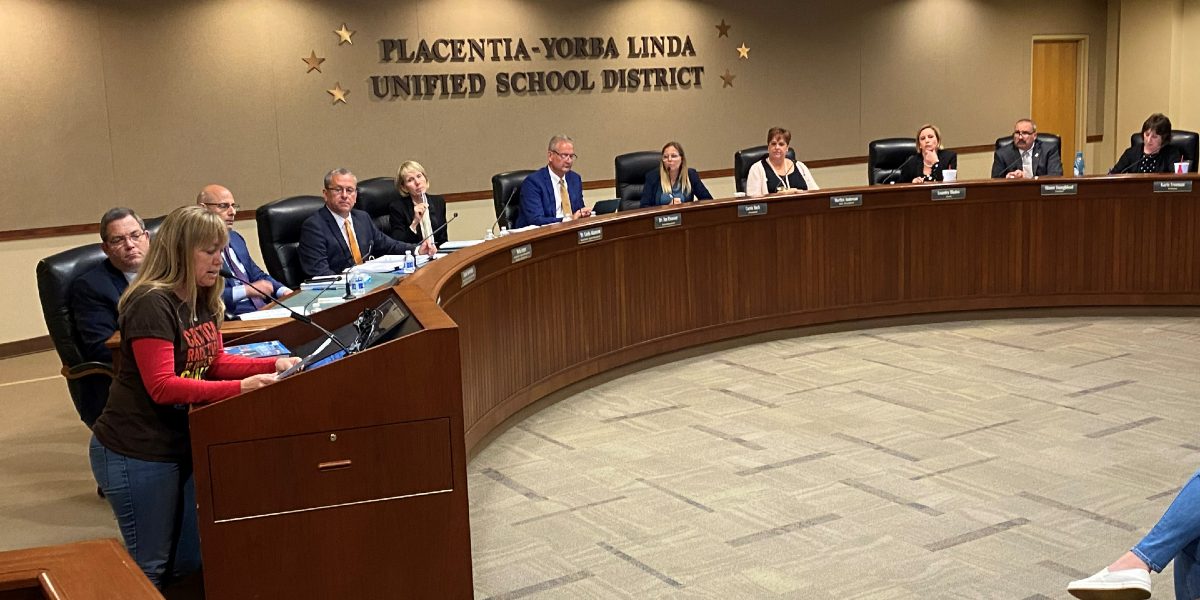In front of a board room packed to overflowing, the Placentia-Yorba Linda Unified School District Board of Education voted 3-2 to ban Critical Race Theory from district curriculum.
The board first began discussing a ban in October 2021, and the process has been attracting national attention, and pitting parent activists who want the district to focus on quality education without having to worry about teachers pushing a radical ideological view of U.S. history in the classroom. On the other side are activist teachers, progressive students and their parents who view the ban as censorship of teaching history through the lens of race and believe it will prevent students from learning about the darker aspects of American history.
The PYLUSD Board hammered out a draft resolution at a workshop meeting last week.
READ: Placentia-Yorba Linda School Board A Step Closer Critical Race Theory Ban
The Board chamber was packed to overflowing. Supporters of the ban wore red, while opponents of the ban were clad in green.
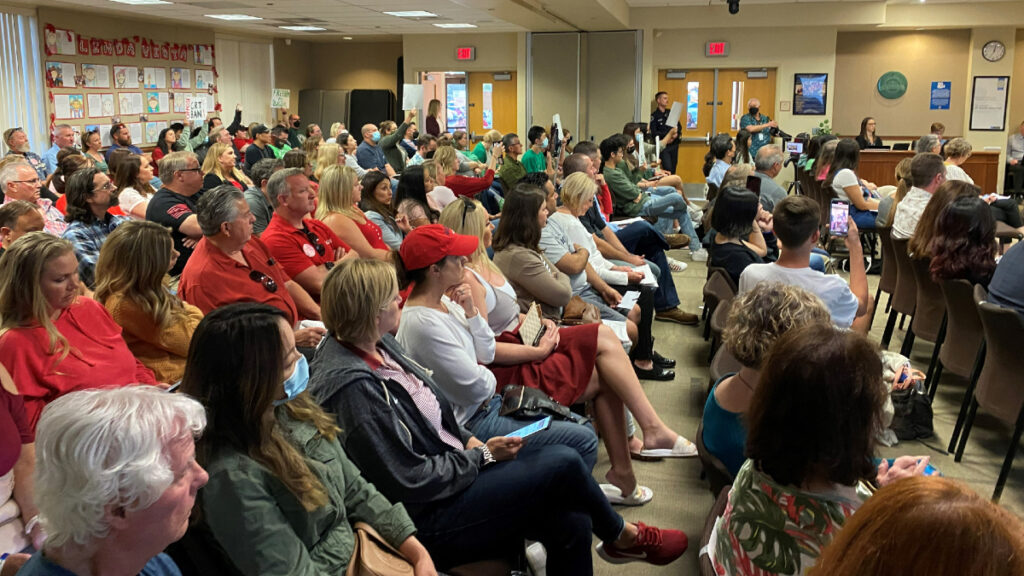
During board member comments at the beginning of the meeting, Trustee Leandra Blades, a leader of the CRT ban effort, addressed the confusion and misinformation floating around regarding the issue. In particular, she talked about feedback from students opposing the ban out of the belief it would mean omitting aspects of American history, such as civil rights leaders Dr. Martin Luther King, Jr., and Rosa Parks.
Blades said she spoke with some of these students, assuring them that was not the case and asking where they had heard that.
“They said, “Well, our teachers are telling us,” said Blades. “That shows how our students really take whatever their teachers tell them as fact.”
55 people turned in speaker cards to address the board about the resolution. Board members agreed to limit comments to 1 minute in the interest of time, and no more speaker cards were permitted once public comments began.
Whenever supporters of the ban spoke, opponents held up placards bearing slogans such as “Don’t Erase History” and “PYLUSD Needs Critical Race Theory.”
The arguments of opponents of the ban primarily revolved around two themes: denying that CRT is present in classrooms but banning it would prevent students from learning authentic American history. They also claimed it would lead the College Board to yank recognition of the district’s Advanced Placement classes, although no speaker making the claim provided evidence the anti-CRT resolution would produce that result.
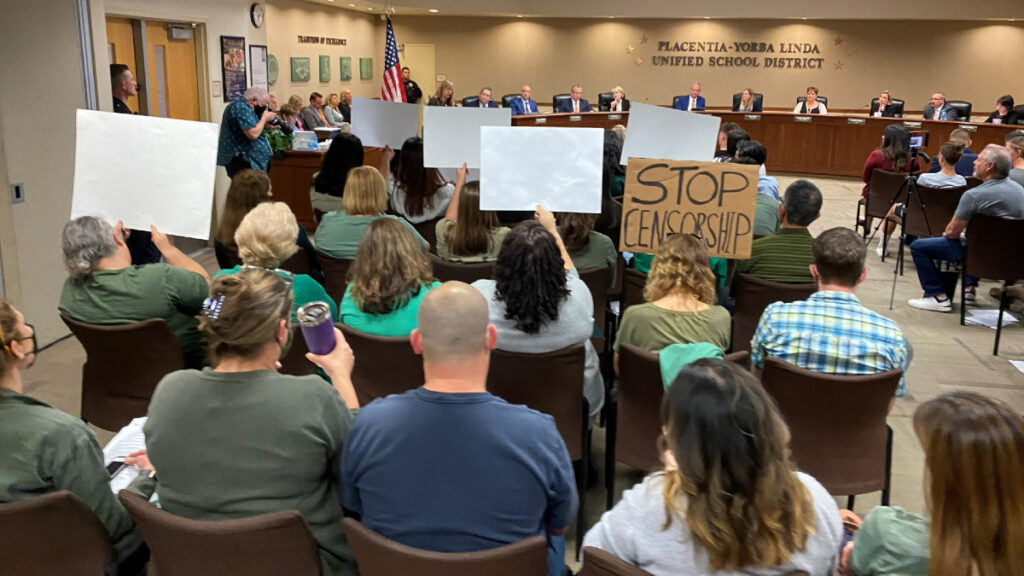
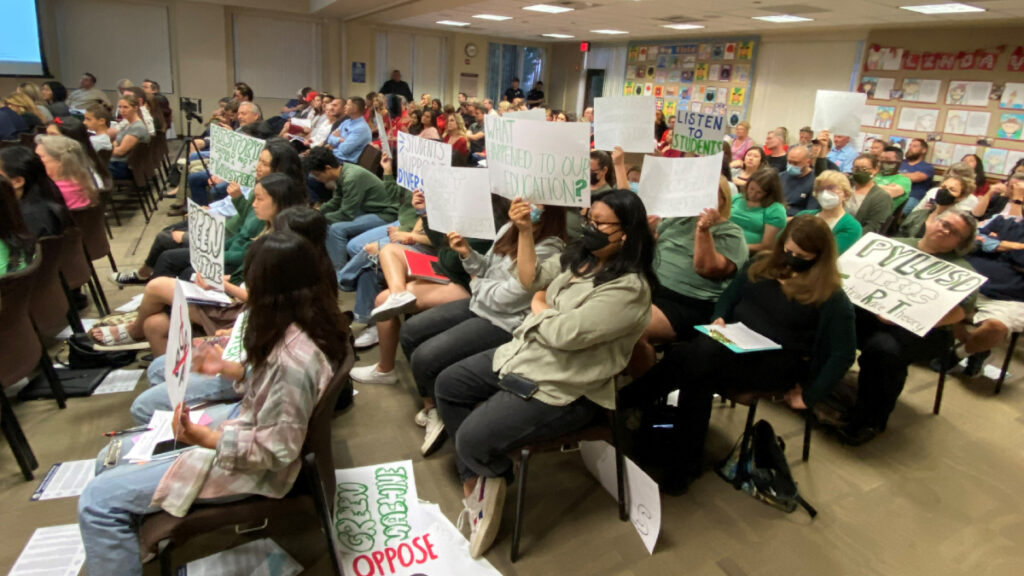
“You say you want to ban CRT, which isn’t being taught in the district,” said Carrie Brunell.
“There is no way to tell the difference between someone who is talking about CRT or quote ‘some other framework,’ and someone who is just talking about racism,” said Josh Raeder, the father of two PYLUSD students, who called the resolution a “template for a witch hunt.”
Sarah Phillips, the librarian at Yorba Linda High School, attacked the CRT ban as an “effort to censor and silence. Efforts to silence the voice of our teachers and our diverse students are wrong and I oppose them.”
While sitting in the audience, Phillips held a placard saying “PYLUSD Needs Critical Race Theory.”
“CRT doesn’t ask you to agree with it. It is merely an ideology.” said student Camille Cong in opposition to the resolution.
A few students from Chapman University and Cal State Fullerton spoke, going beyond mere opposition to advocating embedding Critical Race Theory and race-conscious pedagogy into the district’s curriculum.
Parents Speak Out Against CRT In The Classroom
Most of those present at the meeting were parents opposed to a race-based ideology making its way into the curriculum, calling it divisive and focused on grouping students according to externalities like skin color, rather than treating them as unique individuals.
“I am against CRT. I am a Latino. But most of all, I am an American,” said parent Nicholas Fernandez. “CRT teaches that racism is everywhere. That there are no individuals, just members of two different groups – the oppressor and the oppressed.”
“I’m Mexican, my wife is white, our kids are mixed. So I guess I’m the oppressed, my wife is the oppressor and my kids – I don’t know!” said Fernandez, eliciting laughs from the audience.
“CRT is using skin color to basically create division and judge people,” said Fernandez. “What about character?”
“In no way am I against my children learning about other races and their contribution to building America,” said another parent, Michelle Waterworth. “What I have a problem with is blaming the transgressions of the past on one race. There is not one person sitting in this room right now that had control over the race that they were born to be. Therefore our children should not ever be made to feel responsible for the decisions that were made in the past.”
One parent took issue with the AP cancellation claim, saying “Nothing in this resolution will prevent an AP teacher from teaching the required topics for their courses, therefore they will not lose their status.”
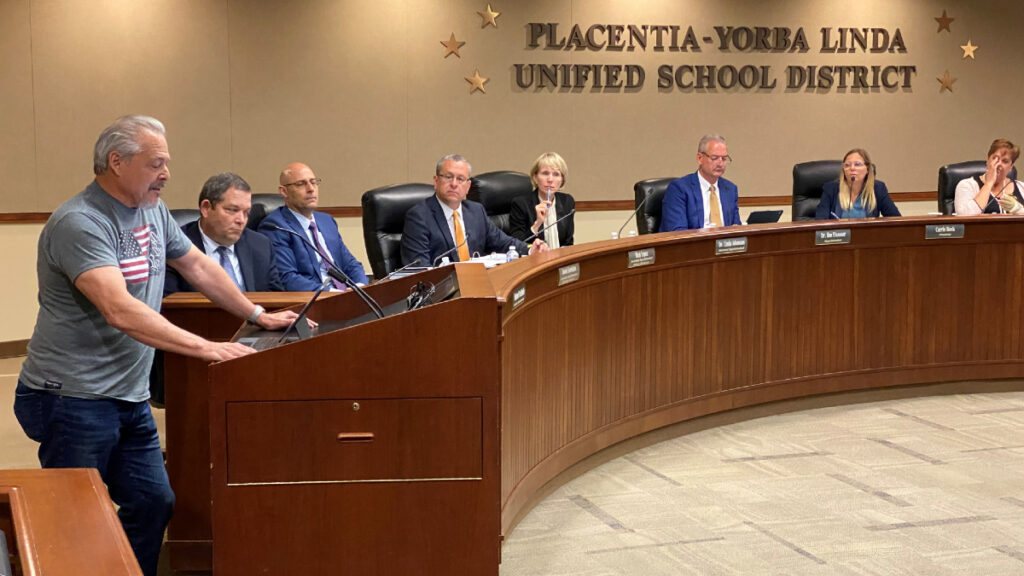
Trustees: CRT Ban Does Not Jeopardize AP Courses
During board deliberations, Trustee Marilyn Anderson said there has been “a lot of misinformation” about the AP issue. She noted that 14 states had passed anti-CRT laws, with no adverse effect on AP courses in their schools.
In order to address concerns, however, Anderson proposed additional language to ensure the CRT ban would not interfere with the teaching of required topics in AP courses.
Two eighth grade students from Kraemer Middle School implored the board not to adopt the resolution, and said a petition to that effect
Trustees Karin Freeman and Carrie moved to table the motion, which died on a 3-2 vote.
After Board President Carrie Buck asked for discussion of the resolution, Trustee Shawn Youngblood quipped, “We’ve probably beat that horse.”
Anderson cited the state’s impending, CRT-informed Ethnic Studies Model Curriculum – which goes hand-in-hand with the recent legislation making Ethnic Studies a high school graduation requirement – as one of her reasons for supporting the ban.
Cal State Fullerton Proud Of Training Teachers To Incorporate CRT In Classrooms
Anderson also characterized the CRT ban as a preventative action given that Cal State Fullerton – whose education school is the top producer of K-12 teachers in Orange County – is training its graduates to infuse CRT principles into their classroom.
Anderson quoted from a letter the Board had received from Fram Virjee, the president of Cal State Fullerton, saying the college is “honor[ed] to populate the classroom and offices of PYLUSD with credentialed teachers and we are also proud that they come to education to effectively explain and include CRT as well as Ethnic Studies in their classrooms, as well as promote diversity, equity and inclusion and social justice.”
“Teachers are coming into our district learning these principles and how to incorporate them,” said Anderson. “This is not imagination. This is what they’re teaching our future teachers and so that’s why I feel it’s really important.
“When teachers come to our district,” said Anderson, “They know that they can just leave that behind. It’s not appreciated, or needed here. We teach race differently.”
Freeman said she feared banning CRT would lead to a “dumbing down” of curriculum, saying there is “no place for censorship” in their classrooms. She compared banning CRT to turning their students into Rip Van Winkles, implying it will lead to students from other districts to “pass them by on the road to success.”
Board President Carrie Buck denounced the resolution as censorship, and argued the board and parents should stay out of curriculum development, and relegate the the board and parents to approving or rejecting curriculum changes or additions developed by staff.
Buck also claimed the district’s students were opposed to the ban, “as you have seen here tonight” – referring to a group of students from the local chapter of “Diversify Our Narrative,” a progressive racial identity advocacy group.
“To sit here and say this is not supported by the teachers union is just silly,” said Trustee Leandra Blades, the moving force behind the resolution.
Alluding to a staff presentation earlier in the evening reviewing fairly appalling student achievement scores, Blades said her sponsorship of the CRT ban was prompted by a desire to get politics out of the classroom and focus on improving educational quality.
“Why are we messing around with this stuff instead of just educating children,” prompting thunderous applause from the audience.
Trustee Youngblood moved adoption of the CRT ban resolution, which was adopted on a vote of 3-2.

